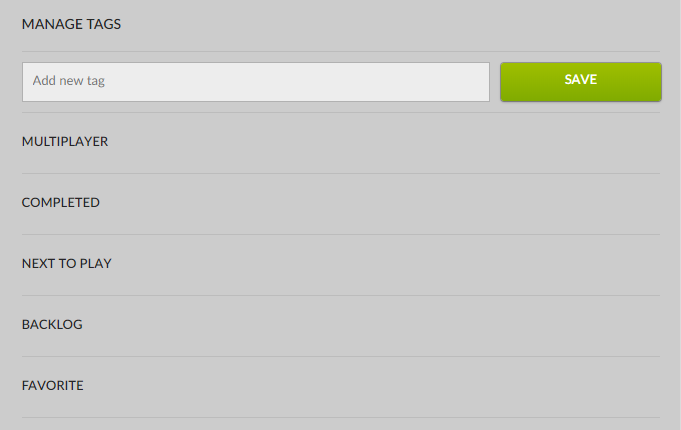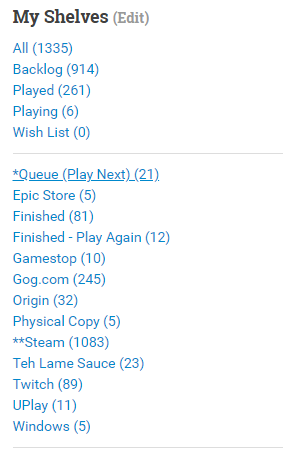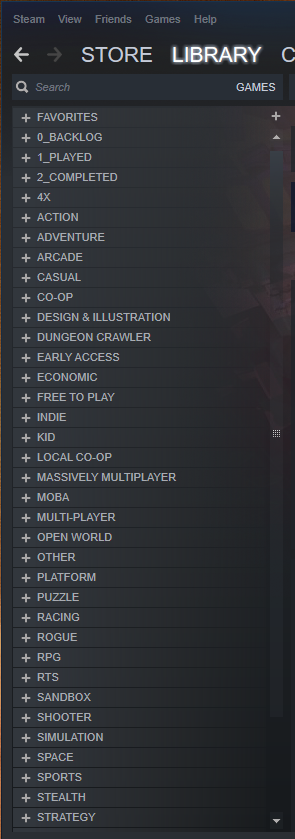I’m a gamer. Video games are what initially interested me about computers. DOS prompts, autoexec.bat, config.sys, and a batch loader to reconfigure the system depending on which game I wanted to play was where I first learned how to configure things. Growing older, however, I find that I don’t have the time for my hobby and I fall increasingly behind on my gaming backlog. Exploring the internet I’ve compiled a way that works for clearing my gaming backlog.
Set your priorities
First off, I’m not saying that you should make gaming the highest priority in your life. I’m happily married now for nearly 16 years. We have five wonderful children ranging from 14 years to 11 months old. Clearly I have “better” things in life to do than gaming, right?
That’s both right and wrong. Scott Hanselman is my programmer/tech superhero. I’ve followed his blog for a long time. He is personable, relatable, and spot-on with topics seemingly at the times of my life when I need them. One particular blog entry he wrote back in 2016 was about how Self-care matters.
Up to that point in life I had allowed my responsibilities and other priorities in life take over. That isn’t necessarily bad, of course. My family has a wonderful home to grow up in, they have all their needs taken care of and most amenities they might desire as well. I, on the other hand, felt overworked and overburdened with life.
Scott’s post wasn’t groundbreaking or anything. It is pure common sense. But to me, at that time, it was a new and foreign concept. Specifically his points about “Pay yourself first” and “Setup Formal Me-Time”. Let’s briefly talk about each of those two points because that’s what ultimately leads up to me and how I’m clearing my gaming backlog.
Pay yourself first
Scott’s post about Self-care matters was not the first time he’d talked about “Pay yourself first”. He wrote back in 2007 about moving to a new job, new house, new baby, and his new home office. In the comments, however, somebody commented about the “WAF” (wife-acceptance-factor) with his office. He replied back “…We have an agreement that we can spend up to $300 without being questioned. Anything more and we need to talk about it first. We also give each other an allowance every two weeks and can use it for whatever.”
Regarding the WAF…it’s more about having a happy wife. We have an agreement that we can spend up to $300 without being questioned. Anything more and we need to talk about it first. We also give each other an allowance every two weeks and we can use it for whatever. That means I can get an XBox game and not get flack for it.
Scott Hanselman
My wife and I struggled with our budget quite a bit early on and frankly, we still struggle on things to this day. That moment, however, helped me realize that we needed to start budgeting specifically for our own personal happiness. We don’t budget much due to some extenuating medical circumstances that keep our finances hostage, but the amount we allow ourselves on a monthly basis is enough to address our basic wants.
Setup Formal Me-Time
This next one is tough for my family.
As a geek I have a long-standing tradition of playing tabletop RPG games with my brothers and some of our friends. Life has taken us different directions so we no longer live in close enough proximity to play around a tabletop. Similarly, we no longer can play weekly like we used to. We have found some combinations of software that work for us to play online and do so on a more or less regular bi-weekly schedule.
Right here then I have a built-in scheduled me-time. On the one hand, yes, this is me-time. But, on the other hand, it is still somewhat an obligation — yes, it is one I have given myself but nonetheless it is an obligation. I’ve previously mentioned that I really enjoy video games. They are my way of decompressing and de-stressing. Playing the tabletop RPG games, while fun, does not do that for me.
Spouse Me-Time
So that’s me. I mentioned this one is tough. My wife needs “me-time” just as much as I need “me-time”, right? She has health issues and spends a bunch of time resting to try and build up strength. That time is frequently used watching TV shows on the various internet providers. What I have to tell myself over and over again is that this is not me-time for her. She would much rather be doing pretty much anything than that.
Her health doesn’t allow her to have regularly scheduled “me-time”, however. In our particular situation I encourage her to take time with friends whenever the opportunity arises. She has a multitude of talent and ability and frequently uses that to provide service to others. This is not me-time for her. Just because it is something she enjoys, I need to remind myself that it isn’t building herself up.
What I’m getting at is that aside from my tabletop RPG game-night I don’t have regularly scheduled me-time for myself because my wife doesn’t have regularly scheduled me-time for herself. I feel guilty taking it. That’s something we need to work on together. But enough of that.
Relationship Me-Time
My wife and I need time together to build and maintain our relationship just as much as we, individually, need time to ourselves. For the past year or so we’ve had regularly scheduled date-night on the first Friday of every month. On the rare occasion that hasn’t worked out we’ve rescheduled it. The point is, however, that it needs to be regular and predictable.
We’ve recently talked about making it once per week which I was initially hesitant to — not because I don’t want to spend that time with her, but because our budget cannot handle it. We figured out a way to make it work without actually spending more money — those “dates” can simply be grocery shopping without the kids, or other tasks.
Let me be clear. We aren’t perfect, we don’t always make it work, but we try.
Clearing my gaming backlog
You came here because you wanted to learn about how I’m clearing my gaming backlog, right? The techniques I have come up with work for me but that doesn’t mean they will work for you. Mileage may vary.
First off I needed to identify what is my backlog. I can define that as every game I own that I’ve never loaded up. That’s a pretty broad definition. At the time of writing that means over 1000 games. Yes, I’m an addict. Different story for another day.
That’s a lot of games. I don’t really play console games… not because I don’t like them but honestly just because they are less convenient for me. My main machine is already a powerhouse to begin with and I always make sure it packs a punch for gaming. Right now said rig has an Intel i7-6700k 4ghz and 32GB ram. Beyond that I’m also packing a GeForce RTX 2070. So, with that in mind, my machine can dev with the best of them and it can game with the best of them.
Organization
Identifying my backlog also requires organizing my backlog. I use a variety of tools to do that. Individually each platform (Steam, GOG, etc) usually has a way to “Tag” or “Categorize” my library. That only gets me halfway. I also use a website Grouvee.com as a master list of all my games.
The gallery above has a screenshot for GOG, Grouvee, and Steam. Take particular note that GOG has “Next to Play” and “Backlog”. Steam has “0_Backlog”, “1_Played”, and “2_Completed”. Grouvee has a “*Queue (Play Next)”. The kicker here is my Grouvee queue.
From a high level this is an overview of how I organize my games. Grouvee is the master-list of games I own across platforms. I keep it updated as possible.
Choosing my queue
Backlog is one thing. It is also a huge thing. Just like software estimation, we need to break it down into smaller and more manageable tasks. My screenshot from Grouvee shows a queue of 21 items. This queue is *not* the same as a queue in programming. It isn’t FIFO nor LIFO. It is more a bucket of things I want to play. Allow me to explain
My queue consists of games that I want to consider playing soon and more or less the order in which I want to play them. In order to feel like I’m accomplishing something I need to play my games in such a way that the list is clearly shrinking. Measurable success.
Here’s my secret: I look the games from my queue up on HowLongToBeat.com and figure out average times. I tend to be a completionist which hampers my ability to finish games quickly though even that has changed over the years. Now that I’ve identified how long the games on my queue are, I pick between 4-6 games off that list and put it on yet another list in a text document. Those games are what I’d categorize as “long” (> 50hrs), “medium” (20-50hrs), and “short” (< 20hrs). I pick one long, 1-2 medium, and 2-3 short games.
Crafting my queue
Now I’m ready to craft my actual play queue. I tend to choose the long or medium one to start with. Why? Simply because those are the games I bought specifically with the intent of playing. I am really into RPGs because of the immersion, story, etc. Inevitably those are also the longer games. We’re talking Fallout, Elder Scrolls, Divinity, and the like. Medium games are more of the action-style story games like the new Tomb Raider series, Dishonored, etc. Short games are my platformers or actiony RPG games like Stories: The Path of Destinies, SteamWorld Dig, etc.

After a long or medium game I’ll play a short game. I want it done “fast”. Maybe I’ll play a couple of short games back-to-back. After that small queue is done I rinse and repeat.
Modifying my queue
It goes without saying that new games are going to come out long before I get to the older ones on my queue. Clearly some of those games are going to be higher priority for me. If you refer back to my current playlist you’ll notice that some of those games are more than six years old. Among the reasons are that, of course, I wasn’t prioritizing me-time several years ago so my backlog was growing much faster than shrinking. It stands to reason, as well, that I had games come along that I was really looking forward to.
I mentioned earlier in this article that you need to “Pay Yourself First.” Well, my allowance is used typically in one of two ways. New computer equipment or new video games. I’m a simple man. I save my allowance for months at a time. Sometimes I’m willing to pay full price for a game that I want to play “immediately” but most of the time I’m willing to wait for a sale. Either way, games get added to my overall backlog.
Bonus Time
My kids like video games. Several of the games on my backlog are actually co-op games purchased specifically for playing with them. Among the favorites are the LEGO video games. Those things are fantastic!
Playing games with my kids kills two birds with one stone. On the one hand I’m able to see my backlog shrink a little. On the other hand I’m spending quality time with my children doing something we can all enjoy. My desk has five controllers at it; two wireless Xbox one controllers, two wireless Xbox 360 controllers, and one wired (3rd party) 360 controller. Playing games with the kids is a hoot.
Sometimes we’ll play games over the network. The three older kids have machines I’ve cannibalized from my rigs over the past decade. I think all three are i7-950s and video cards range from a GeForce 470, 660TI, and 970. (is it just me or as a computer person do you tend to acquire parts randomly?)
Conclusion
Whether you’re a gamer or not I hope this post today gave you ideas about how to clear your own personal backlog. We all have interests, hobbies, talents, etc. We need to give ourselves the time to do the things we like. For me, that’s gaming. Over the past year as I’ve been using the methods described in the post I’ve felt like I’m doing a good job giving myself time and clearing my gaming backlog.
Credits
Photo by Rohit Choudhari on Unsplash




